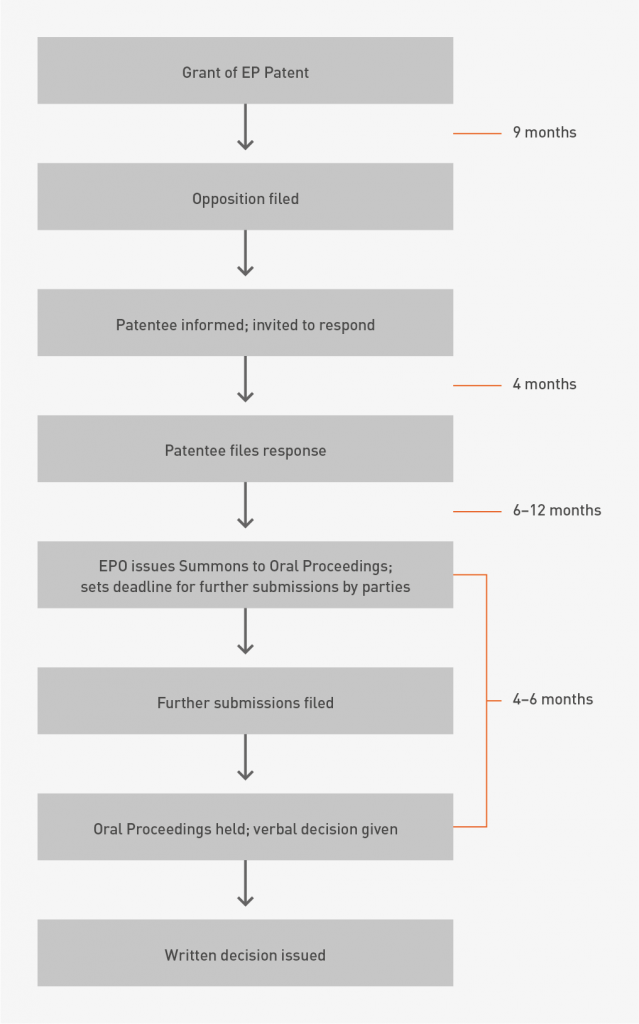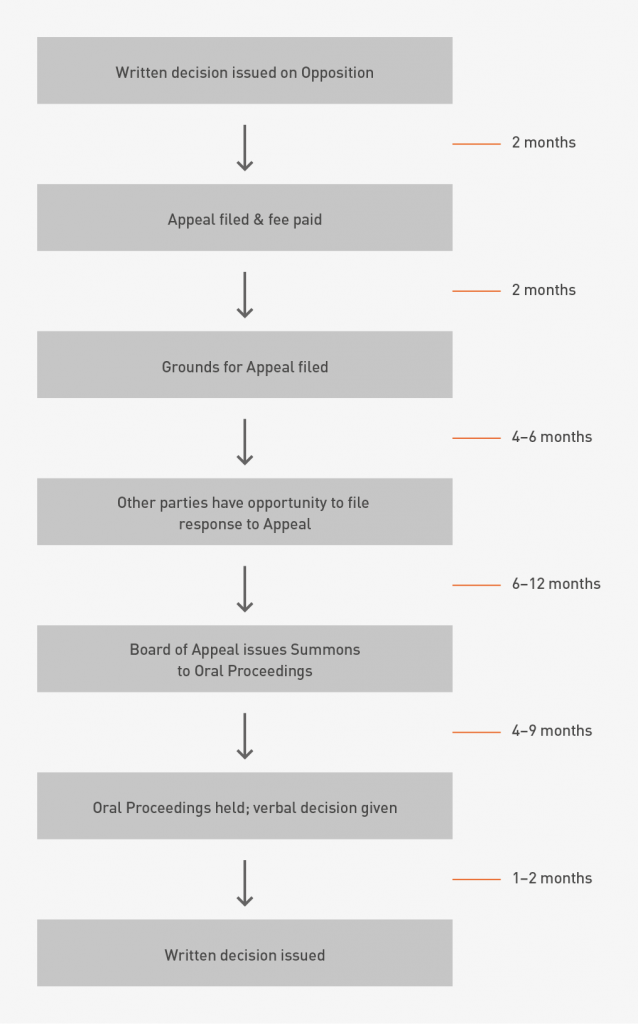The impact of European universities on patenting and innovation in Europe
We highlight the key findings from the EPO’s recent report on academic patenting by European universities.
Central oppositions against European Patents are a popular way to try and remove a potential block to being able to manufacture, import or sell products in Europe.
Although at first glance the central opposition procedure before the European Patent Office (EPO) may seem daunting, the procedure itself is relatively simple, and also relatively cost-effective compared to trying to revoke patents in individual European countries.
If you are successful, an EPO opposition will revoke a European Patent in all countries covered by the patent.
A central opposition at the EPO is also relatively inexpensive compared to the alternative – individual revocation proceedings before the courts of each relevant country. The cost savings in some cases can be in the order of six or even seven figures.
Even if you are not successful with a European Patent opposition, this won’t stop you from filing revocation actions before a court in any relevant European country.
If you are not successful in fully revoking the European Patent but do manage to limit the scope of the patent claims, in many cases this can be just as good as a full revocation, and allow you to manufacture, import or sell your products.
European Patent oppositions can be filed anonymously, and so the patent owner may never know if you are worried about the opposed patent.
Almost anyone may oppose the grant of a European Patent. The only definite ban is the patent owner opposing its own patent.
Central opposition at the before the European Patent Office is only possible within a 9-month period from the publication of the grant of the patent.
After this period, the patent can only be challenged before national courts on a country-by-country basis in the countries the patent is in force. This is much more expensive than opposing it centrally at the EPO.
All of the arguments and supporting documentation should be provided on filing. Not doing so could result in documents filed later not being accepted into the opposition proceedings.
The official fee (€815) must also be paid on filing, otherwise the opposition will be treated as if it had never been filed.
A European Patent can be opposed on a number of grounds:
Once an opposition is filed, the patent owner is informed and invited to respond to the arguments. A deadline of 4 months is usually set. This response may also include amendments to the claims of the patent, and, if necessary, one or more further sets of ‘auxiliary’ claims in case the EPO deems the primary set of claims (or ‘main request’) not to be allowable for any reason. A copy of the response is also sent to the opponent(s).
Normally one or both parties request an in-person hearing (called ‘oral proceedings’), with its submissions.
When the EPO’s Opposition Division has the submissions from each party, and at least one of the parties has requested oral proceedings, then the EPO will set a date and summon the parties to the oral proceedings. At the same time, the EPO will provide a non-binding preliminary opinion on the issues.
If oral proceedings are scheduled, the EPO sets a deadline by which any further submissions ahead of the proceedings must be filed. This deadline is either one or two months before the proceedings.
Any submissions filed after this deadline may not be admitted into the proceedings, although the EPO has the discretion to admit them. However, in practice, the EPO will only admit them if they are particularly relevant to the validity of the patent.
Attendance at the oral proceedings is not mandatory, but they will still take place even if one or all parties decide not to attend.
During oral proceedings, each party takes turns to submit oral arguments on the points raised during the written submissions, with the EPO Opposition Division playing the role of interrogator, devil’s advocate and chairperson of the proceedings.
At the end of the oral proceedings, the Opposition Division will issue a verbal decision on the validity of the patent in its granted or amended form.
A formal written decision is issued after the proceedings.
If none of the parties have requested oral proceedings, the EPO will provide a written decision based purely on the written submissions.
There are three possible outcomes:
The EPO is aiming to speed up the opposition procedure, with the total time needed for a decision in straightforward cases estimated at 15-18 months, calculated from the expiry of the 9-month opposition period.
A typical EPO patent opposition process looks like this:

If one or more parties does not accept a decision of the EPO Opposition Division, then that party may file an appeal. Appeals are generally filed because a party disagrees with the outcome and believes the Opposition Division erred.
In some cases, for example when a patent has been limited but not revoked during opposition proceedings, all parties are not happy with the decision and all parties file an appeal.
Within 2 months of the date of the written decision a party must file a Notice of Appeal and pay the official fee.
If no appeal is filed the decision of the EPO stands and that is the end of the proceedings before the EPO.
The official fee depends upon the entity filing the appeal. For (a) small and medium-sized enterprises, i.e. employing fewer than 250 persons and with an annual turnover no more than €50 million, and/or an annual balance sheet total no more than €43 million; (b) natural persons; or (c) non-profit organisations, universities or public research organisations, the cost is €1955. For any other entity, the official fee is €2705.
If the official fee is not paid, the appeal will be treated as if it had never been filed.
If the Notice of Appeal is filed and the official fee paid, then there is a second deadline by which Grounds of Appeal must be filed. This is set at 4 months from the date of the written decision.
The Grounds of Appeal are the party’s substantive submissions.
If no Grounds of Appeal are filed by the deadline, then the appeal is treated as if it had never been filed, and the appeal fee is refunded.
The Grounds of Appeal should contain a party’s complete appeal case, should clearly set out why the decision should be reversed or amended, and should specify all the requests, facts, objections, arguments and evidence relied upon.
As with the opposition procedure, once an appeal is filed, the other parties are informed and invited to respond to the arguments that have been put forward. A deadline of 4 months is usually set. Likewise, each party’s reply should also contain their complete appeal case.
Further submissions may be filed at a later date, but their admission into the appeal proceedings is at the discretion of the Board of Appeal. In fact, the Board of Appeal is incredibly strict and most late-filed submissions are denied, so it is vital that your Grounds of Appeal are as comprehensive as possible.
When the EPO’s Board of Appeal has the submissions from all parties, and at least one of the parties has requested oral proceedings, the EPO will set a date and summon the parties to the oral proceedings. At the same time, the Board of Appeal may – but does not have to – provide a non-binding preliminary opinion on the issues. In many cases, however, the Board will summarise the issues to streamline proceedings and focus on key issues.
At least one party normally request oral proceedings and the oral proceedings generally proceeds in an identical manner to opposition oral proceedings.
At the end of the oral proceedings, the Board of Appeal will issue a verbal decision on the validity of the patent, and a formal written decision will be issued after the proceedings.
In most cases, this signifies the end of all proceedings on the patent with no further appeal being possible.
If none of the parties request oral proceedings, the Board will provide a decision based on the written submissions.
A typical EPO appeal process looks like this:

For further advice on European Patent oppositions and appeals or to discuss how we can assist you through this process, please get in touch to speak to one of our attorneys.
Notifications